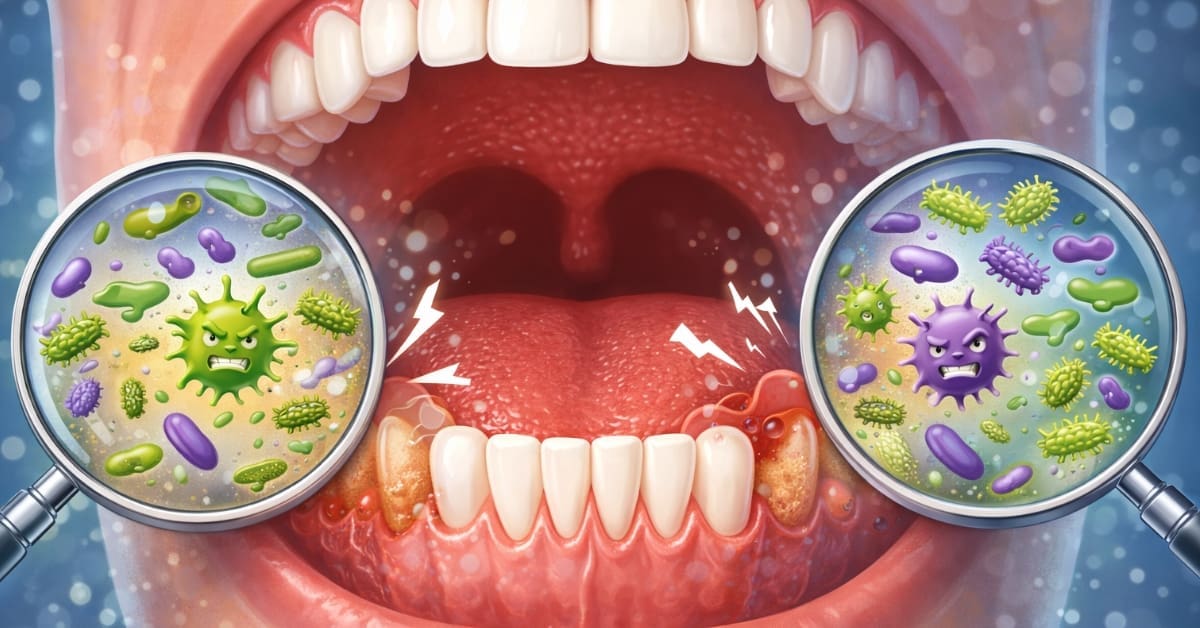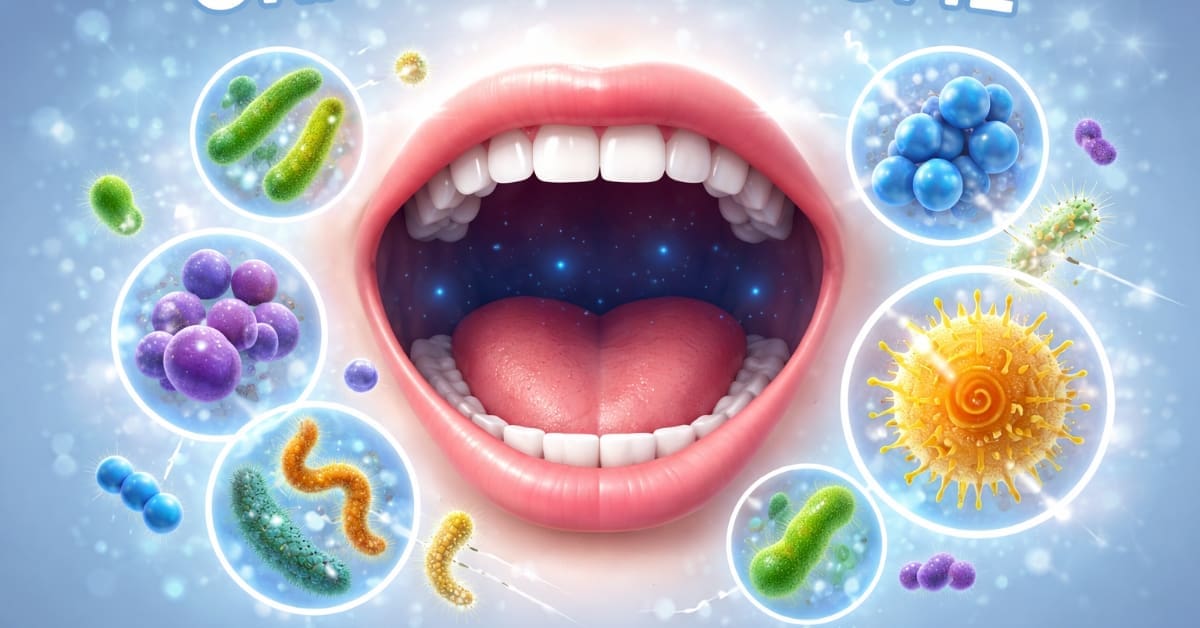Tooth Decay, Be ProActive
What you eat, how often you eat, and how much water you drink can affect your teeth and gums enormously. It’s not just a matter of avoiding sodas and sugary treats – even pure organic fruit juice can put you at risk for tooth decay. And don’t be fooled into thinking that nutritious snacks are not harmful to your teeth. Just as 100% natural fruit juice can cause tooth decay, so can apples, treats made with raw honey and other healthy snacks.
Tooth Decay is Preventable
The good news about tooth decay is that it is preventable. There is a tremendous reward for removing bacteria before it becomes plaque while it’s still easy to remove. In other words, if you don’t remove the film of bacteria that continually develops in your mouth, you allow it to harden into a substance (plaque) that can attack your teeth.
18 ProActive Steps to Avoid Tooth Decay
Maintain a Bacteria-free Zone
Think of it this way: a bacteria factory is in your mouth. Sugars of any kind introduce the exact conditions needed to fuel the assault on your teeth and possibly cause bad breath. Six minutes a day can stop the cycle—two minutes in the morning to brush, two minutes in the evening to brush, and two minutes any time you choose to floss. Choose foods that fight bacteria in your mouth (like fresh basil and cranberries) when you can.
Drink Plenty of Water
Rinse your mouth as soon as possible after eating. If you can’t rinse, at least drink a glass of water.
Snack Wisely and Limit Frequent Eating
Frequent snacking can expose your teeth to a constant attack from acids produced by bacteria. Opt for tooth-friendly snacks like cheese, raw vegetables, nuts, and seeds that can help reduce acid levels and provide nutrients for your teeth. Try to limit grazing throughout the day to allow your saliva to neutralize acids between meals.
Use Fluoride Products
Fluoride is a robust tool in the fight against tooth decay. Use toothpaste and a good mouthwash that contains fluoride to strengthen your enamel and make it more resistant to acid attacks. If you’re at a higher risk for cavities, ask your dentist about fluoride treatments for added protection.
Replace Your Toothbrush Regularly
Your toothbrush doesn’t last forever. Replace it every three to four months—or sooner if the bristles are frayed. A worn-out toothbrush decreases cleaning efficiency and removes plaque from your teeth.
Be Mindful of Acidic Foods and Drinks
Citrus fruits, tomatoes, and sports or energy drinks are highly acidic and can weaken enamel over time. Enjoy these foods and beverages in moderation, and rinse your mouth with water afterward to reduce acid exposure.
Avoid Using Teeth as Tools

Do not use your teeth to open packages, bite nails, or chew on non-food items, as this can cause chipping, cracking, and wear. Protect your teeth by using the proper tools for the job.
Wear a Mouthguard for Sports and Nighttime Grinding
Wearing a mouthguard can prevent damage from impact if you play contact sports. Similarly, if you grind your teeth at night (bruxism), a custom-fitted mouthguard can protect your enamel and prevent long-term damage.
Incorporate Probiotic Foods
Some studies suggest that probiotic foods like yogurt, kefir, and certain cheeses can promote healthy bacteria in your mouth. This can help balance the oral microbiome and reduce harmful bacteria that lead to tooth decay.
Don’t Skip Dental Checkups
Visiting your dentist at least twice a year is crucial for maintaining oral health. Professional cleanings remove tartar that can’t be eliminated at home, and regular exams catch problems early before they escalate.
Use a Straw for Sugary or Acidic Drinks
Use a straw when drinking beverages like fruit juice, soda, or iced coffee. The straw reduces direct contact with your teeth, minimizing acid exposure and helping protect your enamel.
Monitor Your Child’s Oral Health
If you’re a parent, start teaching good oral hygiene habits early. Supervise brushing and flossing until your child develops proper technique, and ensure they eat a tooth-friendly diet.
Consider Dental Sealants
Dental sealants are protective coatings applied to the chewing surfaces of back teeth. They create a barrier against food particles and bacteria, dramatically reducing the risk of cavities in molars. Ask your dentist if sealants would be an excellent option for you or your child.
Rinse with Antibacterial Mouthwash
In addition to brushing and flossing, an antibacterial mouthwash can help reduce bacteria and fight plaque. This is especially useful if you’re prone to gum disease or cavities.
Quit Smoking and Tobacco Use
Tobacco products put oral health at risk and can increase your potential for gum disease, tooth decay, and oral cancer. Quitting tobacco improves your overall health and protects your teeth and gums.
Practice Proper Brushing Technique
It’s not just about brushing—it’s about brushing correctly. Use a soft-bristled toothbrush and hold it at a 45-degree angle to your gums. Use a gentle, circular motion and cover all surfaces of your teeth for at least two minutes.
Pay Attention to Dry Mouth
Dry mouth can increase your risk of tooth decay because saliva is critical in protecting your teeth. If you experience chronic dry mouth, drink water frequently, chew sugar-free gum to stimulate saliva, and consult your dentist for treatment options.
Stay Educated About Oral Health
Knowledge is power. Stay informed about new dental care techniques, products, and research. Your dentist can provide recommendations and advice tailored to your unique needs.
Avoid Tooth Decay and Be Proactive
Contact Suburban Essex Dental to schedule your next dental appointment. Our dental office is located in West Orange, NJ. Let’s set up a consultation and discuss our 18 steps to being proactive about avoiding tooth decay.





